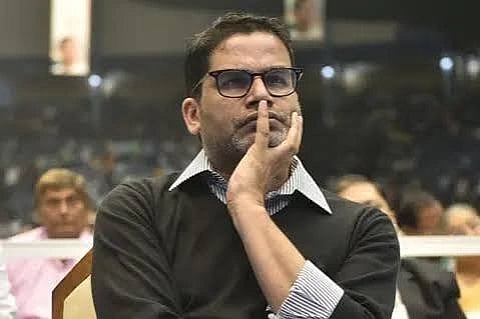
- Home
- न्यूजग्राम
- NewsGram USA
- India
- World
- Politics
- Entertainment
- Culture
- Lifestyle
- Economy
- Sports
- Sp. Coverage
- Misc.
- NewsGram Exclusive
- Jobs / Internships

Political strategist-turned-activist Prashant Kishor reiterated that the upcoming Bihar Assembly elections will primarily witness a contest between the National Democratic Alliance (NDA) and his political initiative, Jan Suraaj, downplaying the relevance of the INDIA bloc in the state’s electoral landscape. Kishor made these remarks during his Jan Suraaj Yatra in Gopalganj district on Sunday, asserting that the traditional bipolar competition in Bihar is shifting towards a new political alternative.
Speaking to reporters, Kishor said, “The INDIA alliance does not seem to be in the fight in Bihar. The main contest is between the NDA and Jan Suraaj. People are ready for a change, and they are looking beyond the traditional parties.” He emphasized that voters in Bihar are disillusioned with both the ruling NDA, led by the Bharatiya Janata Party (BJP) and Chief Minister Nitish Kumar’s JD(U), as well as the opposition Rashtriya Janata Dal (RJD) and Congress, key components of the INDIA bloc.
Prashant Kishor’s statement comes amid increasing political activity ahead of the 2025 Bihar Assembly elections. The NDA, which currently governs the state, is facing anti-incumbency after Nitish Kumar’s multiple political realignments over the past decade. Kumar, who has switched alliances between the NDA and RJD-led Mahagathbandhan several times, is under scrutiny for governance fatigue and rural distress.
The opposition INDIA bloc, comprising RJD, Congress, and Left parties, has also been struggling with internal discord and leadership issues. RJD leader Tejashwi Yadav, who served as Deputy Chief Minister before the latest political reshuffle, has been attempting to mobilize youth voters on unemployment and corruption issues. However, Kishor believes the alliance lacks coherence and credibility to challenge the ruling NDA effectively.
Kishor’s Jan Suraaj movement, launched in 2022, aims to build a grassroots-driven political alternative focused on governance reforms, education, and employment. The movement, which has covered over 10,000 kilometers across Bihar, has positioned itself as a citizen-led initiative rather than a conventional political party. Kishor has consistently argued that Bihar’s political culture needs transformation through people’s participation rather than personality-driven politics.
According to Kishor, the growing public participation in Jan Suraaj’s campaign is an indication of the people’s “desire for systemic change.” He has also ruled out immediate alliances with either the NDA or the INDIA bloc, stating that Jan Suraaj will contest independently with a full slate of candidates in 2025.
Kishor’s remarks drew mixed reactions from established parties. RJD spokespersons dismissed his claim, calling it “wishful thinking,” while BJP leaders downplayed Jan Suraaj’s electoral prospects, saying the NDA remains the dominant force in Bihar politics. JD(U) leaders maintained that Nitish Kumar’s developmental record would secure voter confidence.
Observers see Kishor’s statement as a strategic attempt to project Jan Suraaj as the principal alternative in a state long dominated by caste-based and alliance-driven politics. Political analysts note that while Kishor’s movement has gained traction among youth and urban voters, it faces challenges in translating that support into electoral outcomes.
As Bihar inches closer to elections, Kishor’s assertion marks a significant shift in political discourse—challenging both the ruling coalition and the established opposition, while positioning Jan Suraaj as a reform-oriented, citizen-driven political force. [Rh/MY/VP]
Suggested Reading:
